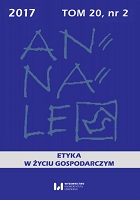Rola sumienia w przeciwdziałaniu zjawisku decouplingu
Conscience as a Phenomenon to Counter Decoupling
Author(s): Michał Kapias, Grzegorz PolokSubject(s): Theology and Religion, Personality Psychology, Psychology of Self, Behaviorism
Published by: Wydawnictwo Uniwersytetu Łódzkiego
Keywords: decoupling;conscience;ethics;person;
Summary/Abstract: Decoupling has been diagnosed since the second half of the last century. It is conceived as a kind of separation, appearing in a variety of organisations, in situations in which established principles or rules, aimed at normalising interpersonal relationships or governing the rules of conduct, despite being officially established, are not implemented. Another situation may also occur. It arises when individuals know and accept the guidelines, but for multiple – often subjective – reasons, they do not materialize as they are blocked by individual decisions. This results in serious consequences of a social, economic, legal or managerial nature. How they be prevented? Solutions based upon ethics seem to be a sound base to counteract the destructive consequences of decoupling. Human conscience is one of the fundamental ethical categories. Deep rooted in every person, it shapes behaviour, even though its impact can also be minimised. It turns out that a properly formed conscience gives better results in personal activity on both the individual and human levels. Also, conscience enables the correct interpretation of what is prohibited and what is expected, and thus becomes the perfect tool for countering decoupling.Finally, it can be assumed that as long as man has a well-constituted con-science and follows its guidance, the negative effects of a split between the recognized rules and their actual observance can be minimised.
Journal: Annales. Etyka w Życiu Gospodarczym
- Issue Year: 20/2017
- Issue No: 2
- Page Range: 19-30
- Page Count: 12
- Language: Polish

